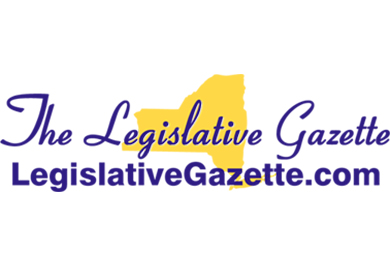 When the Legislative Gazette was founded in 1978, it not only filled a vacuum of journalistic coverage of the New York State Legislature; it began a legacy of providing internship opportunities and real-world reporting experience that has touched the lives of hundreds of SUNY New Paltz students in the years since.
When the Legislative Gazette was founded in 1978, it not only filled a vacuum of journalistic coverage of the New York State Legislature; it began a legacy of providing internship opportunities and real-world reporting experience that has touched the lives of hundreds of SUNY New Paltz students in the years since.
Tagged “the weekly newspaper about New York State government,” the Legislative Gazette has thrived as the premier public affairs reporting internship program in the state under the direction of Gerald Benjamin, distinguished professor of political science and director of The Benjamin Center for Public Policy Initiatives at SUNY New Paltz, and Executive Publisher Alan Chartock.
The Gazette was founded by Chartock in partnership with the College, which connected the publication with students pursuing careers in journalism and public affairs. Through the Gazette internships, students can earn up to 15 credits while gaining invaluable experience working for a professional journalism outlet.
Gazette alumni have gone on to work at publications including the New York Times and the Washington Post, and their ranks include two Pulitzer Prize winners.
The Gazette’s impact has proven to be far greater than its role as a launching pad for young writers and reporters. Over the years it has gained a reputation for providing reliable and influential coverage of issues and events in New York State government and has become a respected, self-sustaining staple of the upstate media.
“The educational mission has always been primary, but our goal is to provide real news, cover the real legislature, which is a very compelling opportunity for our students,” Benjamin said. “Over the years we developed a model through which all expenses were met from advertising, and as the paper grew we were able to hire staff and begin accepting more interns from other schools.”
Unfortunately, the Legislative Gazette struggled to keep revenues up as the explosion of web-based media tightened budgets throughout the print journalism industry. This year, the program’s directors have made the difficult decision to discontinue print distribution and transition to a purely online resource beginning in January 2016.
While this change marks the end of an era for the Gazette, there is a strong sense of optimism that, by forging new relationships with departments and faculty at New Paltz, the Gazette can remain relevant and self-sufficient while continuing to offer one-of-a-kind training experiences to future journalists.
“Part of the goal in going online is to be more inclusive of the various departments at the College, which will sufficiently differentiate us from our competitors and help to generate the revenue we need to make it go,” Benjamin said.
As the Legislative Gazette enters the next phase of its existence, the College will continue to support the paper’s commitment to quality journalism and education through faculty and administrative time and student scholarships.
To learn more about the Legislative Gazette and view archived issues, please visit them online.

